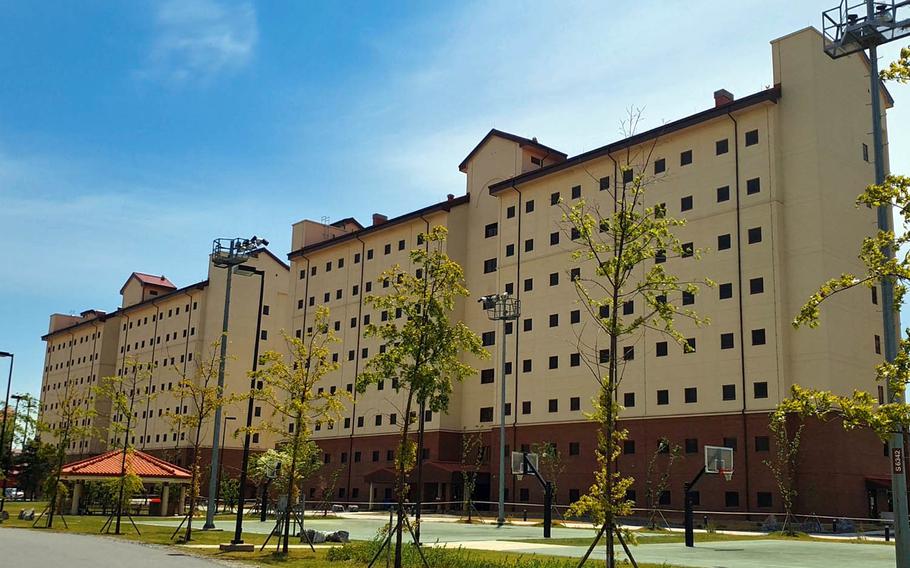
Barracks have been outfitted to house patients who have tested positive for the coronavirus and others who are required to quarantine at Camp Humphreys, South Korea. (Matthew Keeler/Stars and Stripes)
Stars and Stripes is making stories on the coronavirus pandemic available free of charge. See other free reports here. Sign up for our daily coronavirus newsletter here. Please support our journalism with a subscription.
SEOUL, South Korea — U.S. Forces Korea will release asymptomatic coronavirus patients after three weeks in isolation even if they continue to test positive, officials said Tuesday, citing research showing people are no longer contagious after 20 days.
The policy change came as the military has seen an influx of service members and other personnel who tested positive after flying to South Korea from the United States for new assignments or returning from trips abroad.
To prevent further spread of the virus, USFK implemented a strict testing and two-week quarantine process that begins as soon as travelers arrive.
Previously, anybody who tested positive was placed in a specially outfitted on-base isolation facility until they met a series of criteria, including showing no symptoms for at least a week and receiving negative results on two coronavirus tests within a 24-hour span.
Some patients had to remain in isolation for nearly two months without showing symptoms because they continued to test positive.
USFK said Tuesday it has decided to release patients after 21 days in isolation regardless of their test results after close coordination with the U.S. Centers for Disease Control and Prevention and the Korea Disease Control and Prevention Agency.
“Recent medical research studies have indicated that individuals are no longer contagious after 20 days even though their COVID-19 test can remain positive beyond this time,” it said, referring to the respiratory disease caused by the virus.
The Atlanta-based CDC says coronavirus patients may end isolation after 10 to 20 days depending on the severity of their symptoms.
The command will continue to require that all travelers take a coronavirus test upon arrival and undergo a two-week quarantine after which they must test negative again before being released.
“If either test result is positive, they are immediately moved to isolation and placed under the direct medical supervision of a health care provider,” according to a press release.
USFK, which commands some 28,500 service members, noted its policy is still stricter than “both U.S. and [South Korean] release criteria.”
South Korea also requires that travelers are quarantined. However, it allows coronavirus patients to be released from isolation if they have not shown symptoms for 10 days after confirmation that they have the disease, regardless of test results.
KDCA deputy director Kwon Joon-wook confirmed that the South Korean agency had discussed the matter with the U.S. military.
“After around 20 days, the virus is no longer infectious nor viable but rather the continued positive results are caused by dead particles of the virus,” he said during a daily briefing. “Therefore, we see no problem with patients being released on these grounds.”
South Korea has been lauded for its handling of the pandemic with aggressive testing and tracing efforts that have kept its caseload relatively low compared with many other countries.
The numbers spiked in mid-August, prompting authorities to tighten prevention measures that appeared to be having an effect. The KDCA reported a third day of double-digit figures Tuesday with 61 new cases. That raised the total number of cases to 23,106, with 388 deaths.
USFK, meanwhile, has had 193 cases, but only 24 of those were contracted locally. The others were mainly detected in arrivals from the United States.
gamel.kim@stripes.com Twitter: @kimgamel